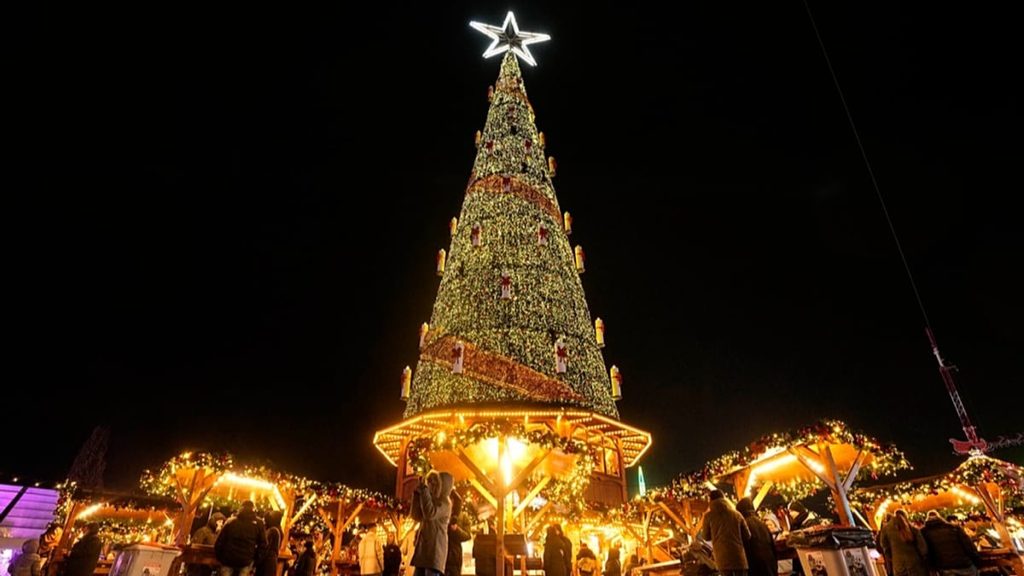Listen to the article
Misinformation about the festive season has already begun to circulate across Europe, with false claims regarding the status of Germany’s beloved Christmas markets gaining particular traction online.
Social media platforms have seen a surge in posts alleging widespread cancellations and extraordinary security measures at German Christmas markets, a cornerstone of the country’s holiday traditions that draw millions of visitors annually.
German authorities and market organizers have been forced to respond to these fabricated reports, which claim that numerous markets throughout the country would remain closed this year due to security concerns or that those opening would be surrounded by concrete barriers and heavy police presence.
“We’re seeing the same pattern of misinformation that has plagued these events in previous years,” said Katja Weber, spokesperson for the German Tourism Association. “These false claims not only damage our tourism sector but also create unnecessary anxiety among potential visitors and local communities.”
The Association of German Christmas Market Organizers reports that all major markets are proceeding with their traditional openings in late November. This includes iconic locations such as Nuremberg’s Christkindlesmarkt, Dresden’s Striezelmarkt, and Berlin’s Gendarmenmarkt, which collectively attract over eight million visitors each year.
The spread of such misinformation has economic implications for Germany, where Christmas markets generate approximately €3 billion annually for local economies. Small artisans and vendors, who depend on the six-week holiday season for a significant portion of their yearly income, are particularly vulnerable to reduced attendance resulting from false security concerns.
Thomas Müller, who has operated a handcrafted ornament stall at Frankfurt’s Römerberg market for over two decades, expressed frustration about the situation. “Every year we see these rumors, and every year they hurt our business. People cancel trips based on things they read online without verifying if they’re true.”
Security experts note that while standard precautions remain in place at public gatherings throughout Europe, including Christmas markets, there are no extraordinary measures being implemented this season beyond those that have become routine in recent years.
“There’s a fundamental difference between reasonable security measures and the fortified zones described in these false reports,” explained Jörg Radek, former deputy chairman of Germany’s police union. “Visitors will encounter the same level of security they’ve experienced in recent years, which is designed to be effective while remaining largely unobtrusive.”
This wave of misinformation appears to be part of a broader pattern targeting cultural events across Europe. Digital media researchers have identified coordinated campaigns spreading similar false narratives about holiday celebrations in France, Austria, and the Netherlands.
“We’re seeing increasing sophistication in how these false claims are distributed,” said Dr. Claudia Schmidt, a digital misinformation researcher at the University of Munich. “They often start on fringe platforms before being amplified through more mainstream social media channels, gaining credibility with each share.”
The European Commission has recently launched an initiative to combat seasonal misinformation, working with social media platforms to flag and remove demonstrably false content about public events. However, the rapid spread of such claims continues to outpace verification efforts.
Tourism officials across Germany are now proactively reaching out to international visitors with accurate information about market openings and security arrangements. Many market organizers have created dedicated sections on their websites specifically addressing common misconceptions.
“The tradition of Christmas markets is centuries old in Germany, and they will continue despite these annual attempts to spread fear,” said Weber. “We encourage visitors to check official sources for information rather than relying on unverified social media posts.”
German Christmas markets typically open in the last week of November and continue until just before Christmas, with some extending through the New Year. Tourism agencies report that despite the misinformation, advance bookings for holiday travel to Germany remain strong, suggesting that many travelers are becoming more discerning about their information sources.
Fact Checker
Verify the accuracy of this article using The Disinformation Commission analysis and real-time sources.




10 Comments
Interesting to see the response from German officials to the false reports about Christmas market cancellations and heightened security. It’s good they’re being proactive in setting the record straight and confirming the markets are proceeding as normal.
Absolutely, maintaining public trust in these cultural events is crucial, especially during the holiday season when they draw so many visitors.
Interesting to see the spread of misinformation around German Christmas markets. I’m glad the authorities are pushing back on these false claims and that the markets are proceeding as normal. It’s important to rely on official sources for accurate information.
Absolutely, these kinds of fabricated reports can be really damaging. It’s good the organizers and tourism association are being proactive in responding to the misinformation.
Disappointing to see this kind of misinformation spreading about the German Christmas markets. It’s good the authorities are pushing back and confirming the markets are proceeding as normal. These false claims could really hurt tourism if left unchecked.
Absolutely, the organizers are right to be proactive in addressing these fabricated reports. Maintaining the public’s trust in these events is crucial.
This is a timely reminder of how quickly misinformation can spread, especially around major cultural events like the German Christmas markets. Glad to hear the authorities are on top of debunking these false claims.
Yes, it’s important for people to rely on official sources when it comes to information about these kinds of longstanding traditions and events.
The German Christmas market tradition is such an integral part of the holiday season there. I’m relieved to hear the major markets are still moving forward with their openings despite the false claims circulating online.
Yes, the Christmas markets are a beloved cultural institution in Germany. It’s concerning to see the spread of misinformation trying to undermine that.